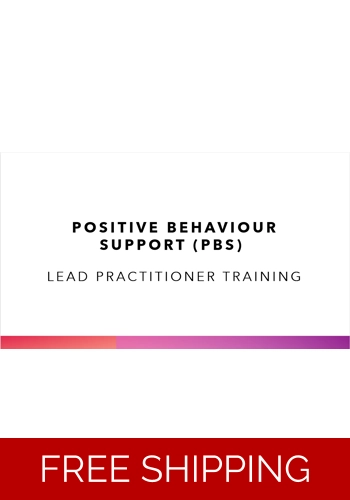Positive Behaviour Support LEAD PRACTITIONER PBS
Positive Behaviour Support LEAD PRACTITIONER - Training Resources
Enough resources for single sessions, single aspects or a two day course with workshops. All editable.
These training resources are for LEAD Practitioners or those training to be LEAD Practitioner.
37 Files in total (Presentation (in sections) , Handouts x 13, Learning Activity documents x 12 ( with a selection of case studies), 10 Trainer Aides (Model Answers etc.) and End of Session Multiple Choice Assessment.
All editable - includes aims and objectives or you can adapt.
Overall Aim: To provide staff with the knowledge and skills to implement Positive BehaviourSupport (PBS) in a person-centredmanner, fostering a culture of proactive care and support across all settings
Learning Objectives:
Understand the key principles and values of Positive Behaviour Support (PBS)
Learn how to apply PBS strategies effectively in everyday care practice
Explore the role of the Lead Practitioner in leading and embedding PBS within a team or service
Gain practical tools and techniques for developing and implementing individualised PBS plans
Presentation (142 Slides)
Aims and Objectives
Introduction
Positive Behaviour Support (PBS)
Focus on Quality of Life, Not Just Behaviour
Your Role
Evidence Based and Person Centred
Your Role
Section - Core Values and Ethos of PBS
Person Centred Planning
Your Role
Inclusion, Dignity and Respect
Your Role
Proactive and Preventative Approaches
Your Role
Improving Quality of Life
Your Role
End Comments
Section - The PBS Framework
Values
Key Values and Your Role
Theory and Evidence Base
Your Role
Process (Functional Behaviour Assessment)
Your Role
Practice (Skills and Environmental Adaptation)
Your Role
End Comments
Section - Understanding Behaviour - Not Just 'Challenging'
Behaviour as Communication
Your Role
Context and Unmet Needs
Key Considerations for Lead Practitioners
Trauma Informed Care Principles
Your Role
Summary for Lead Practitioners
Section - Functional Behaviour Assessment (FBA)
FBA
Your Role
Antecedent Behaviour Consequence (ABC) Model
Gathering and Analyising Data
Key Points for Lead Practitioners
Case Example
Case Example Intervention Plan
End Comments
Section - Developing a PBS Plan
Co-Production with the Person and Support Network
Key Points for Lead Practitioners
Primary, Secondary and Reactive Strategies
Primary Strategies (Preventative)
Secondary Strategies (Skill Building)
Reactive Strategies (Response to Behaviour)
Supporting Skill Development and Coping Mechanisms
Skills Development
Coping Mechanisms
Summary for Lead Practitioners
Section - Proactive vs. Reactive Strategies
Proactive vs. Reactive Strategies
Proactive Strategies - Preventing the Behaviour Before it Starts
Positive Reinforcement
Embedding Proactive Support into Daily Practice
Reactive Strategies - Responding to Behaviour When it Occurs
Reactive Strategy - De Escalation Techniques
Reactive Strategy - Crisis Intervention - Last Resort Only
Section - Role of the Lead Practitioner
The Role of the PBS Lead
Coaching and Mentoring Others
Embedding PBS in care Plans and Team Culture
Monitoring and Evaluating PBS Implementation
Advocacy for Person Centred Support
Closing Message
Section - PBS in Different Settings
Adapting Leadership Across Environments
Residential Homes
Supported Living
Day Services
Schools and Childrens Homes
Secure Units and Hospitals
Closing Reflection
Section - Recording and Reporting Behaviour Ethically
Recording and Reporting Behaviour Ethically
Objective, Clear and Respectful language - Your Role
Confidentially and Data protection - Your Role
Reflective Practice and Incident Debriefs
Section - Staff Wellbeing and Support
Leading with Care and Compassion
Supervision and Reflective Practice
Dealing with the Emotional Impact
Team Cohesion and Shared Responsibility
Section - Legal and Ethical Framework
Embedding PBS in Practice
Human Rights Act 1998
Mental Capacity Act 2005
Your Role
Restraint and Reduction Network (RRN) Standards
Care Quality Commission (CQC)
Kings Fund, NICE Guidance
Section - Embedding PBS Culture
Leading Organisational Change
Leadership and Modelling Good Practice
Ongoing Training and Development
Working with Families and Professionals
Celebrating Success and Learning from Incidents
Section - Summary and Key Takeaways
Key Principles
Applying PBS in Everyday Care
Role of Lead Practitioner
References and Further Resources
Word Documents
End of Session Assessment
Handouts x 13
Learning Activities x 12
10 Trainer Aides (Model Answers)
HSC Training Link
Training Resources for Health and Social Care
Supplying training resources for the health and social care sector since 2004.
Resources purchased are emailed to you via Zip Folder attachment or via Microsoft 365 link (your choice).
All packs are written in a generic style and can easily be adapted to suit your own specific training delivery.
Secure payments via PayPal Merchant Commerce Platform.
You do not need a PayPal account to use this payment
gateway.
Debit and credit card payments accepted.


